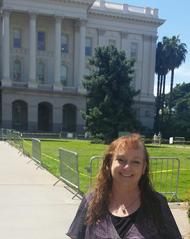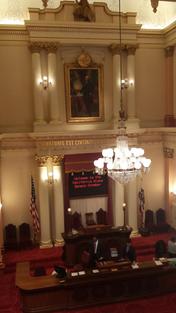LEGISLATIVE DIRECTOR
TREVA KELLY
|
SB 654 (Min) 2021-22
Child Custody: a bill to protect children in family court
On June 22, 2021, we attended the virtual meeting for the California Senate Judicialry Committe to express support for SB 654. The bill was passed 10-0 and re-referred to the California Senate Approprations Committe. The bill passed both houses and as of 09/04/2021 is on Governor Newsom's desk, ready to be signed in to law.
SB 654 will protect children in family court from unnecessary emotional distress. It specifies that children who want to address the court directly regarding their custody or visitation preferences will not be required to do so in the presence of their parents, and clarifies that court-connected professionals must indicate to the judge as soon as possible that the child has changed their choice.
The bill also requires courts to consider a history of abuse and substance abuse when deciding on unsupervised visits, not just on custody. It requires the court to state reasons on the record if the court makes an order for unsupervised visitation to a parent with such a history. This bill is important because children who have been abused are easily intimidated by the presence of the abusive parent in the courtroom, as several of us know from personal experience.
|
SB 26 (Leyva) 2017-2018
Sex offenders: Access to schools
SB 26 prescribes the authority for a person who is registered sex offender and who holds the right to make educational decisions for a student at a K-12 school to be on that school’s campus but only if supervised by a school employee while in the school buildings or upon school grounds. This bill authorizes a person who is required to register as a sex offender, but who is not required to register of the specific offenses as follows; touching an intimate part of another person if the touching is against the will of the person touched, forcible rape, forcible sodomy, and lewd and lascivious acts against a child under the age of 14 years. This bill is currently suspended in the Appropriations Committee as of 5/15/17.
|
|
|
|
|
| AB 558 (Quirk-Silva) 2016-2017
Sex Offenders: Close familial loophole
Eliminates the right of a relative of the victim who has been convicted of a misdemeanor offense of annoying or molesting a minor to petition the Department of Justice (DOJ) for exclusion from the Megan's Law Website. We keep on working towards a safer childhood. This subject was brought up in AB 2569 by Melendez (see below). We were not successful then but us progressing towards laws to protect every child from being the victim of another Pedophile. This bill passed the third reading of the Assembly as of 5/30/17.
The only no vote was again, Assembly Member Bill Quirk.
<An odd occurrence with this bill. Upon review, as of 10/30/17 this bill has been altered into an air resources bill and no longer has the original language relating to sex offenders. This is very concerning and a call is into Quirk-Silva for clarity on this.>
|
|
|
|
|
AB 2569 (Melendez) 2015-2016
Sex Offenders: Victims Right to Reject Family Exclusion
AB 2569 would provide that before certain intra-familial sex offenders who have been granted probation can be excluded from public disclosure on the Megan’s Law website, the defendant must have served probation for at least one year, and the victim makes the determination of the right to be excluded from the Sex Offender Registry. This may come as a shock but yes, upon the creation of Megan's Law there has been the right for a sex offender related to the victim to request not to be published online. The idea at the time was to protect the victim. If the suspect were identified, then so was the victim. However, it is common for the family to be the first victim of the predator. The other shock is when you check Megan's Law before letting your child stay the night at a friends, this sexual predator is NOT online. This bill as of 11/30/2016 has died. However, AB 558 picked up this issue in the 2016-2017 session.
|
|
|
|
 |
| Treva Kelly, our Legislative Director on the north side of the California State Capitol. 11/30/2014. This bill was a little different. The governor vetoed the bill but the Senate on 8/25/2014 and the Assembly on 8/27/2014 passed it with 100% yes votes. Then it went into law on 11/30/2014. |
|
| SB 924 (Beall) 2013-2014
Damages: childhood sexual abuse: statute of limitations.
CONGRESS PASSED 11/30/2014 (Civil)
Our ISSB Legislative Director, Treva Kelly testified in support of this bill on behalf of ISSB. Over the last 27 years the California Legislature has come to have a better understanding of the insidious and latent nature of the injuries suffered by a child who has been sexually abused and the reasons why victims of childhood sexual abuse (“CSA”) often wait years before reporting the abuse to law enforcement or otherwise. California Code of Civil Procedure, Sec. 340.1, a remedial statute intended to provide redress to CSA victims, has been amended no less than five times since its original enactment in 1986, consistent with this evolving knowledge of the latent effects of the original abuse. This bill extends the statute of limitations from 28 years of age to 40 years of age or within 3 years of the date the plaintiff discovers or reasonably should have discovered that psychological injury or illness occurring after the age of majority was caused by the sexual abuse, whichever period expires later. In many cases it takes this long for the victim to come to a place of recovery and is strong enough to battle the courts on their own behalf. This bill allows the victim to sue the predator in civil court to award money that is needed for the treatment we need to heal.
|
SB 926 Statute of limitation: felony sex crimes. (2013-2014)
SIGNED BY GOVERNOR ON 9/30/2014. (Criminal)
Treva Kelly, ISSB’s Legislative Director, testified in support of SB 926 to extend the statute of limitation (SOL) for crimes of childhood sexual abuse from a victim's 28th birthday until the victim's 40th birthday. As victims we were told that the SOL had passed and the authorities were not able to charge the predator for the crimes on children. It is well documented medical research shows that victims of these horrible crimes suffer from P.T.S.D. and severe memory loss. With the psychological damage caused of CSA coupled with the high rates of recidivism found in sexual predators, there is a real need to expand the time survivors of these horrible crimes may come forward and file a complaint with law enforcement. The current law favors the abuser by letting the time run out to file a criminal complaint before the victim of the abuse is ready. This potentially has serious public safety consequences by letting sexual predators wait out the clock and the chain of abuse continues.
|
 |
| Floor of California's State Capitol. |
|
|
ANOTHER VICTORY!
|
 |
| California State Capital Building, May 28, 2009 |
|
|
AB 612
In 2008 and 2009, ISSB members lobbied in favor of AB 612, written by Assemblymember Jim Beall. AB 612 is a bill to prevent unfounded theories from being used to take children away from their protective parents and placed into the custody of their alleged abusers. Family courts are currently allowed to ignore evidence of abuse, and place child into custody of their abusers without investigating the abuse allegations. This has lead to several children being murdered or committing suicide, and it needs to be stopped.
AB 612 was effectively killed by the California State Senate Judiciary Committe, who amended the bill to the point that it became meaningless. Assemblymember Jim Beall still lists the bill on his home page, but was unable to bring it any closer to passing in 2010.
|
 |
| Celebrating the passage of SB 33, California's Circle of Trust Bill: Alison Arngrim from Protect.org, Andrea Ransdell from ISSB, Betsy Salkind from Protect.org |
|
|
SB 33: California's Circle of Trust Law
Andrea Ransdell and more than a dozen other ISSB members lobbied, along with Protect.org activists, including Grier Weeks, actress Alison Arngrim, comedian Betsy Salkind, and Bikers Against Child Abuse to pass California's Circle of Trust Law, SB 1803 in 2004, and SB 33 in 2005. (Most ISSB members choose not to post their pictures or names on the ISSB website for personal and/or legal reasons)
The Circle of Trust Law reverses California's previous "Incest Exception" law. Before SB 33 was passed, even though adults who raped someone else's child would go to jail, adults convicted of raping their own children would be sent back home to live with the victim, thanks to an Incest Exception Law that had been passed in 1981. The courts wanted to believe that it was OK to send the child home with her convicted rapist, but victims of this 1981 law came forward to testify about the repeated abuse, and the huge betrayal they felt after being sent back home after the conviction to suffer more sexual abuse. SB 33 passed, thanks to Senator Jim Battin--and thanks to ISSB members and hundreds of other supporters. Rapists are no longer given free reign to "grow their own victims." California's Circle of Trust Law has set a precedent for passing similar bills in other states.
Please read more about SB 1803 and SB 33 at The Zero: 2004/2005 California Circle of Trust Campaign and on the Protect.org website at What the passage of the Circle of Trust Bill Means to America
|
 |
| Andrea Ransdell speaking at the Bill signing ceremony for AB 2893, September 2006 |
|
|
AB 2893
In 2006, several members of ISSB wrote letters and lobbied in support of AB 2893 (Mountjoy) , a bill which made it a little more difficult for convicted, registered sex offenders to have unsupervised custody of their own victims. As it was originally written, AB 2893 would have made it impossible for registered sex offenders to re-gain custody, but the bill had to be weakened it to get it through the committees.
The final version of AB 2893 which was signed into law states that, if a judge decides to award unsupervised custody to the person who molested that child, a written explanation for the decision has to be filed with the decision. This will make it possible for the child's lawyer to appeal the decision. The law previously allowed family court judges to award unsupervised custody without any explanation at all, and this made it almost impossible for the child's lawyer to file an appeal, which unfortunately had resulted in children becoming severely depressed and even committing suicide.
The new law is not very strong, but AB 2893 is setting a precedent to help pass stronger laws to protect children in the future.
Andrea Ransdell, who, in 2006 was the Legislative director of ISSB, had the opportunity to speak at the bill signing ceremony for AB 2893
|
|